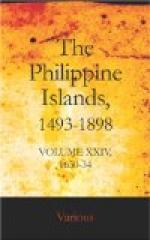near Manila. It seems as if death selected, among
all, those of most renown, although those who were
left were distinguished. Let us conclude this
triennium with the fact that our father provincial—although
it seemed from his goodness that he would not try
to declare himself too fully, nor to influence the
province against his will—at last, thinking
that he, because of his greater experience in its
affairs than others had, could arbitrate in a so important
matter, accordingly set his eyes on father Fray Antonio
de Ocampo, whom we have already mentioned above—a
person certainly worthy of greater things, and a calificador
of the Holy Office. Our father thought it easy
to accomplish his intentions, for he found many who
thought the same. But the one who opposed him
was of great account and a great giant, namely, the
father master, Fray Pedro Garcia, the brother of the
archbishop, who did not lack followers and partisans.
The contention, if I do not say that it was greater
than the former one, was not less. It is a remarkable
thing, and certain to befall a monarchy, that when
it is about to come to an end it slips and totters.
Consequently, it was always suspected that those appointed
by the province were announcing some new method of
governing. The governor also—who was
then Don Fernando de Silva, of the habit of Santiago,
and who had been sent by the viceroy of Nueva Espana—took
a part in it, so that the affairs of the order should
not go outside of its limits. Finally, it was
our Lord’s pleasure that they should settle
upon a third person, namely, our father Fray Hernando
Becerra, a person very deserving of what the order
has given him.
CHAPTER XL
Of the election of our father Becerra
We have already related that our father, Fray Hernando
Becerra, from the time that he set foot in Filipinas,
was always climbing the rungs and going from good
to better. He came to the islands in the company
brought by our father visitor, Fray Diego de Guevara;
and as soon as he was ordained, that same year of 1610,
he was sent to Ilocos to be minister in that province.
Beyond any doubt at the time of his arrival, he made
so good an impression on those in authority, and they
regarded him as so worthy of eminence, that almost
immediately he was given the chief priorate of that
province, called Bantay. He came to vote, therefore,
at the following chapter, and remained in the province
of Tagalos, with the title of reader of theology.
Soon after that the bishop of Camarines, then visitor,
selected him as his associate in the general visitation.




